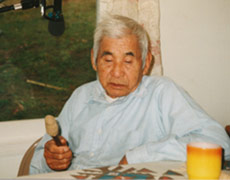Walker Calhoun / Eastern Band Cherokee, Big Cove, North Carolina

Up along a winding dirt road in the Smokie Mountains of North Carolina lives Walker Calhoun with his wife, Evelyn. Their small, unimposing house is perched on the side of a mountain in the village known as Big Cove. Nearby, the Raven Fork of the Oconaluftee River races down the mountain to the town of Cherokee, which is a sprawling tourist town filled with shops selling Indian souvenirs to the tourists. In January, it is nearly deserted.
Walker is a member of the Eastern Band of Cherokees. He was born in these mountains and heard only Cherokee spoken until he was 12 years old. His family had little in the way of material wealth, but he was drawn to the music and dances of his people. Will West Long, Walker’s uncle, was a medicine man and leader of the dance from 1904 to his death in 1947. Walker started the Raven Rock Singers from the members of his own family in order to keep alive the ancient songs and dances. In 1988 Walker received the first Sequoyah Award for his contribution to the preservation of the culture of the Cherokee Nations. In 1990, he was also recognized by the state of North Carolina with the Folk Heritage award. The Cherokee nation once occupied a huge territory that spread out over what are currently Kentucky, West Virginia, North and South Carolina, Georgia, Alabama and Tennessee. They lived in permanent villages in log, cane, and mud structures and had a highly organized form of national government. The people called themselves Ani Yunwiya, which means “the principal people,” and were the largest single tribe in the south. The name Cherokee was given to them by other Indian tribes and meant “people who speak another language.” The Cherokee first made contact with the white man when Hernando De Soto wandered into Cherokee country in the 16th century. There were, at that time, approximately 25,000 Cherokee. From 1684 to 1835 a constant influx of white settlers moved through their lands. The Eastern Band of Cherokee is descended from those who fled to the mountains to avoid relocation during the “trail of tears.” |
Listen to a Sample HereNow Available!
|
